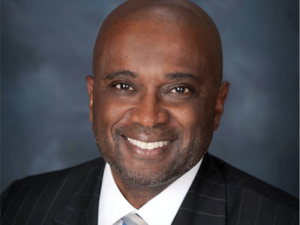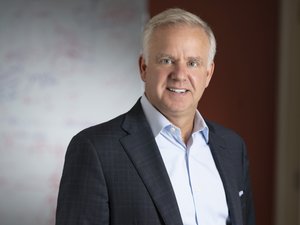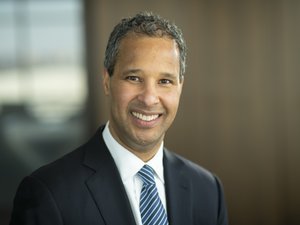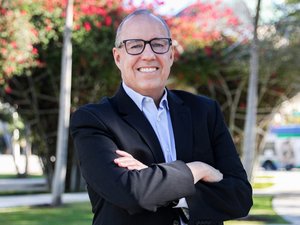When people think of Washington D.C., they think politics — or, you know, House of Cards.
“The D.C. technology scene has been dominated by defense and cybersecurity. It’s dominated by the Pentagon and the NSA,” said Michael Slaby, the co-founder of Chicago-based political startup Timshel and former Chief Technology Officer for Barack Obama's 2008 election campaign.
It was Chicago's social entrepreneurial energy that kept Slaby there after the 2012 election, rather than moving to D.C., and what led him to launch his political tech company there.
“A lot of the energy around Chicago ends up being focused on social enterprise and civic tech, which I really like about the environment here,” Slaby said. “In a few other startups communities, you get sneered at, you get patted on the head, like ‘How cute.’ You don’t in Chicago."
In D.C., the tech scene is undoubtedly a large presence. D.C.’s tech sector employs over 29,000 people, including those in startups and larger companies, according to the District. But, of course, it’s hard to know exactly what kinds of startups are coming to D.C. — which is why Foster.ly launched its DC tech census project.
But those startups in D.C. that identify as a political startup still seem more designed for lobbyists, NGOs or government services, rather than on making it easier for voters to navigate the somewhat confusing political world.
An argument can be made for D.C.-based Polis app, run by Kendall Tucker. The startup launched in Boston in July 2015, but recently expanded into D.C. Tucker’s app started as a data service that helped door-to-door canvassers plan their routes. So, sure, it’s campaign focused and aimed at reaching voters.
However, recently, the company has shifted from serving campaigns and canvassers to more commercial and enterprise customers, which was purely accidental. Polis started getting requests from major retailers one day and edited their software to fit the demand.
“We’re actually selling mostly commercial now, which is funny because a year ago we moved to D.C. to be close to our customers. We really wanted to understand what the best political minds were thinking,” Tucker said.
“Now, we do a lot of corporate work, which means we could genuinely be anywhere in the country.”
Washington, D.C. is known as a federal city and a political city. But as the District's economy shifts away from that — Federal spending did not increase last year, but the region still generated 59,800 new jobs last year, according to the 2030 Roadmap group out of George Mason University — it makes sense that the political tech companies flocking to D.C. end up helping more commercial and enterprise clients.
So where do all of the voter and campaign-focused political startups go?
Well, in this case, the obvious answer seems to be the right one: Where the political campaigns are.
Naturally, campaigns are based where the voters are. And those who volunteer or work with campaigns, and who also have the entrepreneurial spirit, tend to find themselves in major hubs like Chicago or Boston.
It’s not just where the politicians are. It’s where the people are.
Just ask Elsa Sze. She’s the founder and CEO of Boston-based Agora, which created an online platform that allowed people to voice their opinions to elected officials without having to be at a town hall meeting.
“I actually think that D.C. has a lot of established players in terms of politics — so central government, Congress and all that,” Sze said. “When you talk about political tech and civic tech, it’s not just where the politicians are. It’s where the people are.”
Sze said her technology was successful because they were based where the constituents were. With an app that is rooted in making New England town hall meetings more accessible to people who work or can’t make it to meetings, Sze saw Boston as a better place to launch than D.C.
That’s not to say that her app wasn’t shaped by Boston’s existing startup ecosystem. Sze says that, like most tech hubs outside of Silicon Valley or New York, Boston is still pretty enterprise heavy, which influenced her company to start selling their platform to companies and non-government entities as a way of letting employees voice their opinions more easily.
“There’s still a lot of enterprise-focused companies in Boston. Not a lot of consumer-facing tech,” she said. “It’s very B-2-B.”
Very few startup hubs are entirely politics focused, of course. As a Chicago founder pointed out, it’s hard to make your political startup financially viable.
“There’s a real business challenge between what do you do between cycles,” said Derek Eder, founder of civic technology company DataMade. “I think from a cultural and government and societal good standpoint, they’re absolutely necessary. But they’re not going to be the next IBM.”
But. in an optimist’s world, technology should make life easier for people in their day-to-day lives. Yet you don’t see many D.C. political startups working to make it easier for voters to navigate a daunting political world.
You can see that, though, in Chicago startup BallotReady. It’s designed to make researching your ballot easier so you’re not left unprepared for those nonpartisan or judicial elections on your ballot.
As a founder, I’m weary of people who are too stuck in their ways.
Founder Alex Niemczewski, who is originally from D.C., said, in Chicago, it does seem like there are a lot of political startups out there.
“Government itself is the slowest to innovate because that’s how it has to because you have so many conflicting points-of-view that you have to take into account, and that’s kind of the point of government is to be slow,” she said. “As a founder, I’m weary of people who are too stuck in their ways, traditional, and sometimes that how you have to be in government.
What kinds of political tech companies come to D.C.?
This doesn’t mean that D.C. doesn’t attract political tech companies. (If they didn’t, then how did we even run a roundup of the political tech companies to know? Magic?)
And again, without a centralized dataset of D.C. startups, it’s hard to know outside of anecdotal evidence how many startups in D.C. identify as political ones.
But it appears that D.C. is attracting a certain kind of political tech company: Ones focused on civic tech or campaign data. Think NGP VAN or Quorum Analytics or Phone2Action.
That’s why you’ll find political startup Civis Analytics, which works with campaign data and other enterprise services, in both D.C. and Chicago.
"Both in the case of Chicago, with access to excellent universities, as well as in D.C., where we are seeing the largest and most impactful clients in the world, we’re trying to exploit an advantage that we have over the largest tech giants in the world to attract the greatest engineers and data scientists," said Matt Lackey, vice president of research and development in Civis.
Kate Mereand, tech and innovation manager for the District’s small and local business development office, said whether or not you see a small or large number of political startups in the district just depends on your definition of “political” and “voter facing.”
“When you define political, I do think we get a lot of startups that look at an international space and they might be here to locate near the embassies or locate near NGOs that have headquarters that are here,” Mereand said.
FiscalNote founder and CEO Tim Hwang launched his company in Silicon Valley and then moved to D.C. within its first year. He said that he sees a lot of the startups moving out of the Valley and moving into the city that they service. In D.C., that's a bit different than what people would expect.
"D.C. really hasn't had a breakout company that services the industry of Washington, which is politics and government and the pop culture element of 'House of Cards,'" he said.
"I think the reason is because in reality D.C. is a great place for enterprise software — you have all of the trade associations, the federal government and you just have a very institutional feel."




